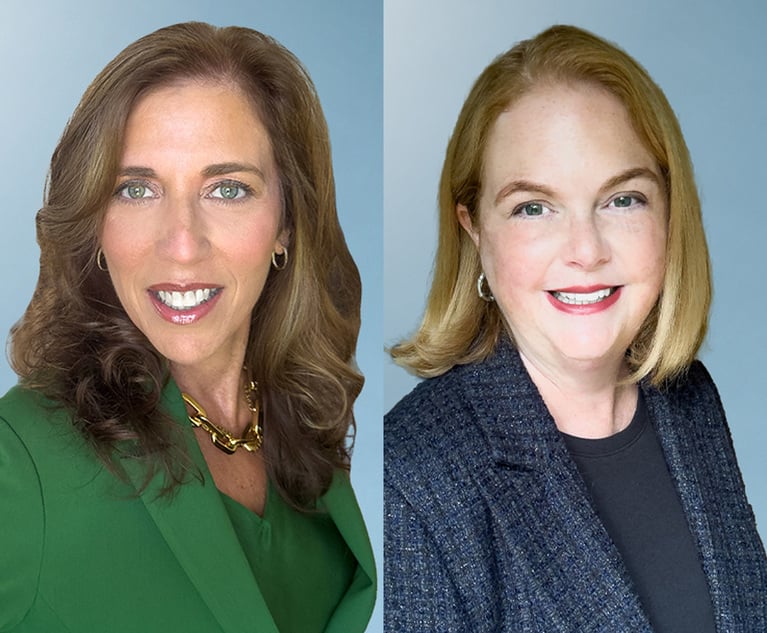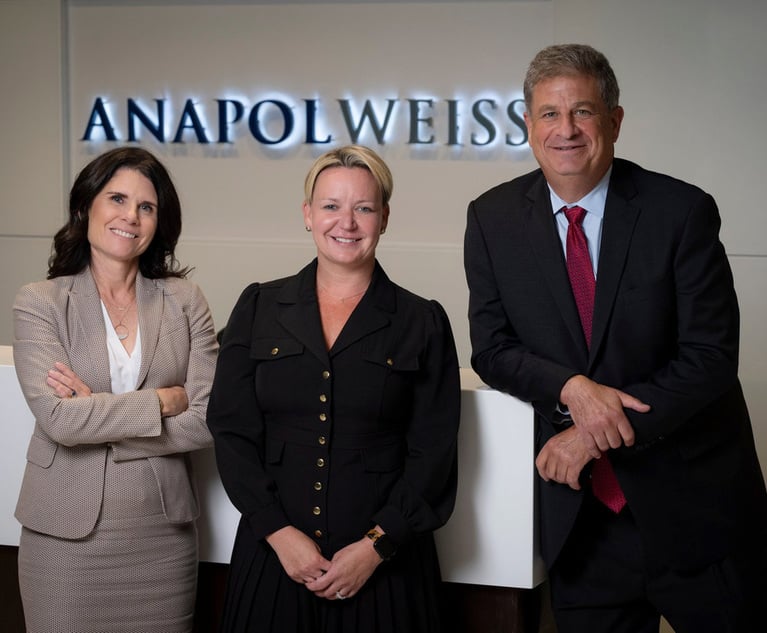 David Lowe.
David Lowe.Bay Area Boutique in Spotlight as Silicon Valley's Workplace Problems Persist
In Silicon Valley, employees are still battling the same workplace problems that have existed for more than a decade, said David Lowe, managing partner of Rudy, Exelrod, Zieff & Lowe.
February 23, 2018 at 06:45 PM
5 minute read
In Silicon Valley, employees are finding themselves on the frontlines of workplace issues that for more than a decade have continued to crop up at leading technology companies, said David Lowe, managing partner of San Francisco-based employment law firm Rudy, Exelrod, Zieff & Lowe.
Lowe's 10-lawyer boutique has handled thousands of employment-related cases since fellow name partners Mark Rudy and Steven Zieff co-founded the firm in 1986. Despite the recent #MeToo movement and some high-profile cases that have been brought against technology giants, Lowe, who has been with Rudy Exelrod for more than 22 years, said the issues facing those that his firm often represents have persisted throughout the years.
“We still have a long way to go,” he said.
Lowe is the lead lawyer in a suit filed earlier this week by former Google Inc. engineer Tim Chevalier against the technology industry titan for gender-based discrimination, harassment, retaliation and wrongful termination.
Chevalier, who is transgender, queer and disabled, claims that Google fired him for politically liberal content he posted on internal message boards, including criticism of former Google software engineer James Damore, who also sued the company in January after being fired for authoring a memo that argued in part that women were less suited for technology jobs than men.
Damore's firing, which the National Labor Relations Board recently defended, and the subsequent suit he filed against Google have spurred a national conversation about how companies should handle digital discussions about workplace diversity.
“The tools and mechanisms that managers and co-workers use to discriminate against and harass employees have evolved with technology,” Lowe said. “Now, with internal group messaging platforms, we are seeing a whole new type of harassment and discrimination on a broader scale.”
Chevalier's suit against Google, filed on Feb. 21 in San Francisco Superior Court, is seeking damages for his lost wages, emotional distress and punitive damages, as well as injunctive relief against the alleged harmful acts.
Last week, Lowe and his colleague Michelle Lee, who was recently promoted to partner at Rudy Exelrod, filed another suit against Silicon Valley venture capitalist Lucio Lanza that accused him of sexually assaulting 29-year-old entrepreneur Rachel Danae Vachata during a red-eye flight from San Francisco to Minneapolis.
Lowe said the two cases his firm filed this month are new variations on familiar themes.
“In the Vachata v. Lanza case, we are combating the way male venture capitalists use their power in the technology and startup community to exploit women, but for decades we have been fighting similar battles in other settings where men have been put in powerful positions over women, such as law firms and the C-suites of large companies,” he said. “Similarly, the Chevalier v. Google case is about how new technologies are impacting workplace harassment and retaliation, but the underlying bias and retaliatory animus are the same issues our firm has been litigating for 30-plus years.”
Rudy Exelrod gained national notoriety for its representation of former Cravath, Swaine & Moore associate Ellen Pao in her high-profile discrimination suit against storied venture capital firm Kleiner Perkins Caufield & Byers. Although Pao lost that case in 2015, Lowe said the litigation unveiled some repeating workplace issues that have arisen in Silicon Valley.
“As with every case we file, our primary goal is to help our clients vindicate their important legal rights, shine a spotlight on injustice and achieve an outcome that not only compensates them financially, but also deters other companies from engaging similar misconduct in the future,” Lowe said.
Mark Rudy, who has retired as a partner at Rudy Exelrod and is now a full-time mediator at the firm, said that since the allegations against movie mogul Harvey Weinstein emerged late last year, his firm has seen an increasing number of women, and sometimes men, go public with their claims of mistreatment.
Generally, most of these victims end up negotiating a confidential settlement with a company or harasser, Rudy said. However, under the recently enacted federal tax reform law, no tax deduction can be taken for any payment made in settling sexual harassment claims if the payment is subject to a nondisclosure agreement, which makes it harder for many companies to settle. As a result, Rudy expects more disputes to end up in court.
“The suits they brought have been bringing more attention to these important issues,” said Lowe of his clients. “Litigation is an important tool for social change, but it is not the only tool. Lawsuits are only effective in achieving social change when they are paired with broader movements.”
Lowe said he is currently working on 25 litigation and negotiation matters, with a majority of them being compensation disputes and retaliation cases from whistleblowers, many of whom allege some form of discrimination or sexual harassment by their current or former employers.
When he joined Rudy Exelrod in 1995, Lowe was the eighth lawyer in the door at the boutique. He was promoted to partner in 2003 and became a name partner at the firm in 2008. Lowe said that Rudy Exelrod is likely to remain at about the same size in the future.
“It allows us to give very personal attention to every client, work very closely together as a team, and be selective about the cases we take on,” he said.
Lowe added that Rudy Exelrod's revenue comes from individual cases and class action ligation. According to its website, the firm has obtained the largest overtime judgment in U.S. legal history in the class action case, Bell, et al. v. Farmers, which resulted in a landmark $210 million judgment against the insurance giant.
This content has been archived. It is available through our partners, LexisNexis® and Bloomberg Law.
To view this content, please continue to their sites.
Not a Lexis Subscriber?
Subscribe Now
Not a Bloomberg Law Subscriber?
Subscribe Now
NOT FOR REPRINT
© 2024 ALM Global, LLC, All Rights Reserved. Request academic re-use from www.copyright.com. All other uses, submit a request to [email protected]. For more information visit Asset & Logo Licensing.
You Might Like
View All

Faegre Drinker Adds Three Former Federal Prosecutors From Greenberg Traurig
4 minute read
Anapol Weiss Acquires Boutique Led by Star Litigator Alexandra Walsh
5 minute read
Pierson Ferdinand Lures Veteran M&A Specialist From Sheppard Mullin in Silicon Valley
4 minute readTrending Stories
- 1Friday Newspaper
- 2Judge Denies Sean Combs Third Bail Bid, Citing Community Safety
- 3Republican FTC Commissioner: 'The Time for Rulemaking by the Biden-Harris FTC Is Over'
- 4NY Appellate Panel Cites Student's Disciplinary History While Sending Negligence Claim Against School District to Trial
- 5A Meta DIG and Its Nvidia Implications
Who Got The Work
Michael G. Bongiorno, Andrew Scott Dulberg and Elizabeth E. Driscoll from Wilmer Cutler Pickering Hale and Dorr have stepped in to represent Symbotic Inc., an A.I.-enabled technology platform that focuses on increasing supply chain efficiency, and other defendants in a pending shareholder derivative lawsuit. The case, filed Oct. 2 in Massachusetts District Court by the Brown Law Firm on behalf of Stephen Austen, accuses certain officers and directors of misleading investors in regard to Symbotic's potential for margin growth by failing to disclose that the company was not equipped to timely deploy its systems or manage expenses through project delays. The case, assigned to U.S. District Judge Nathaniel M. Gorton, is 1:24-cv-12522, Austen v. Cohen et al.
Who Got The Work
Edmund Polubinski and Marie Killmond of Davis Polk & Wardwell have entered appearances for data platform software development company MongoDB and other defendants in a pending shareholder derivative lawsuit. The action, filed Oct. 7 in New York Southern District Court by the Brown Law Firm, accuses the company's directors and/or officers of falsely expressing confidence in the company’s restructuring of its sales incentive plan and downplaying the severity of decreases in its upfront commitments. The case is 1:24-cv-07594, Roy v. Ittycheria et al.
Who Got The Work
Amy O. Bruchs and Kurt F. Ellison of Michael Best & Friedrich have entered appearances for Epic Systems Corp. in a pending employment discrimination lawsuit. The suit was filed Sept. 7 in Wisconsin Western District Court by Levine Eisberner LLC and Siri & Glimstad on behalf of a project manager who claims that he was wrongfully terminated after applying for a religious exemption to the defendant's COVID-19 vaccine mandate. The case, assigned to U.S. Magistrate Judge Anita Marie Boor, is 3:24-cv-00630, Secker, Nathan v. Epic Systems Corporation.
Who Got The Work
David X. Sullivan, Thomas J. Finn and Gregory A. Hall from McCarter & English have entered appearances for Sunrun Installation Services in a pending civil rights lawsuit. The complaint was filed Sept. 4 in Connecticut District Court by attorney Robert M. Berke on behalf of former employee George Edward Steins, who was arrested and charged with employing an unregistered home improvement salesperson. The complaint alleges that had Sunrun informed the Connecticut Department of Consumer Protection that the plaintiff's employment had ended in 2017 and that he no longer held Sunrun's home improvement contractor license, he would not have been hit with charges, which were dismissed in May 2024. The case, assigned to U.S. District Judge Jeffrey A. Meyer, is 3:24-cv-01423, Steins v. Sunrun, Inc. et al.
Who Got The Work
Greenberg Traurig shareholder Joshua L. Raskin has entered an appearance for boohoo.com UK Ltd. in a pending patent infringement lawsuit. The suit, filed Sept. 3 in Texas Eastern District Court by Rozier Hardt McDonough on behalf of Alto Dynamics, asserts five patents related to an online shopping platform. The case, assigned to U.S. District Judge Rodney Gilstrap, is 2:24-cv-00719, Alto Dynamics, LLC v. boohoo.com UK Limited.
Featured Firms
Law Offices of Gary Martin Hays & Associates, P.C.
(470) 294-1674
Law Offices of Mark E. Salomone
(857) 444-6468
Smith & Hassler
(713) 739-1250






